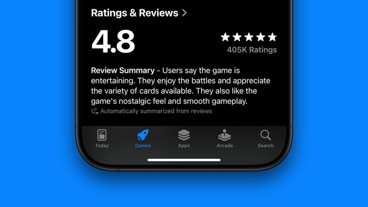Apple's App Tracking Transparency (ATT) privacy feature has a marked effect on businesses such as Facebook, and now German regulators will examine whether it is anti-competitive.
ATT has reportedly caused a 15% to 20% drop in revenue for advertisers, and most notably was blamed by Facebook in an announcement about a hiring freeze. Now the Bundeskartellamt, Germany's Federal Cartel Office, is to investigate Apple's feature.
"We welcome business models which use data carefully and give users choice as to how their data are used," said Andreas Mundt, President of the Bundeskartellamt, in a statement. "A corporation like Apple which is in a position to unilaterally set rules for its ecosystem, in particular for its app store, should make pro-competitive rules."
"[However, we] have reason to doubt that this is the case when we see that Apple's rules apply to third parties, but not to Apple itself," continued Mundt. "This would allow Apple to give preference to its own offers or impede other companies."
The Bundeskartellamt says that Apple's rules seeming "do not affect Apple when using and combining data for personalized advertising." The regulator reports that its preliminary findings "indicate that Apple is not subject to the new and additional rules" of ATT.
Apple's response
"Apple believes in thriving and competitive markets, and through the App Store, we've helped millions of developers turn their brightest ideas into apps that change the world.," an Apple spokesperson told AppleInsider. "In Germany alone, the iOS app economy supports hundreds of thousands of jobs and has given developers of all sizes the same opportunity to share their passion and creativity with users, while creating a secure and trusted place for customers to download the apps they love."
"Privacy has always been at the center of our products and features," continued the spokesperson. "At Apple, we believe that a user's data belongs to them and they should get to decide whether to share their data and with whom."
"We have long believed in the power of advertising to connect businesses with customers— and that you can have great advertising with great privacy," says Apple. "App Tracking Transparency (ATT) simply gives users the choice whether or not they want to allow apps to track them or share their information with data brokers. ATT does not prevent companies from advertising or restrict their use of the first-party data they obtain from users with their consent."
"These rules apply equally to all developers — including Apple — and we have received strong support from regulators and privacy advocates for this feature," continues the spokesperson. "Apple holds itself to a higher privacy standard than almost any other company by providing users with an affirmative choice as to whether or not they would like personalized ads at all."
"We will continue to engage constructively with the FCO to address any of their questions," concludes the Apple spokesperson, "and discuss how our approach promotes competition and choice, while protecting users' privacy and security."
This investigation comes as the Federal Cartel Office continues its examination of alleged anti-trust issues concerning the App Store.
Updated: June 14, 8:45 Eastern with Apple's comments.
 William Gallagher
William Gallagher







-m.jpg)






 Marko Zivkovic
Marko Zivkovic
 Christine McKee
Christine McKee
 Andrew Orr
Andrew Orr
 Andrew O'Hara
Andrew O'Hara


 Mike Wuerthele
Mike Wuerthele
 Bon Adamson
Bon Adamson




-m.jpg)



10 Comments
Apple is doing something for privacy!
Does Apple even collect the kind of data in their apps that would even require permission for? Perhaps if that it is the reason, their apps should state that. Regardless, I think German regulators are just jumping on the EU anti US tech company bandwagon but will likely find there is nothing to see.
There is a vocal minority that has been busy trying to frame app tracking transparency as a means for Apple to bolster ads inside the app store, and simultaneously implying that Apple uses data improperly to generate those ads.
However Apple only produces ads based on what the user specifically searches for, via a typical keyword bidding system. Suggestions are similarly built without peeking on the user outside of the app, such as correlating data sources against the user.
An important distinction here is that “tracking” ads are not based on what you did inside the app, but instead based on places you may have visited around the internet, your physical location over time, purchases made on entirely different platforms and even the content of your text messages. That is what Google and Facebook do to serve ads and it is done in a measurable way to watch the impact from an ad impression through to an eventual purchase.
The “windfall” for apple is merely being the only provider of ads inside their own store front. All forms of direct (i.e non-creepy) advertising have seen improvements since the introduction of app tracking transparency.
In any discussion of Apple's ATT, we should keep in mind that it is up to each individual user to decide whether to allow/disallow tracking, and they can make this choice for each individual app. As long as Apple's own apps respect that user decision as all iOS apps are required to do, then where is the special preferencing of Apple? Or is it just that Apple, as the creator/controller of its own platform, potentially can make that platform do anything it wants, while third parties cannot, and that is an unfair advantage in the eyes of power-mad regulators?